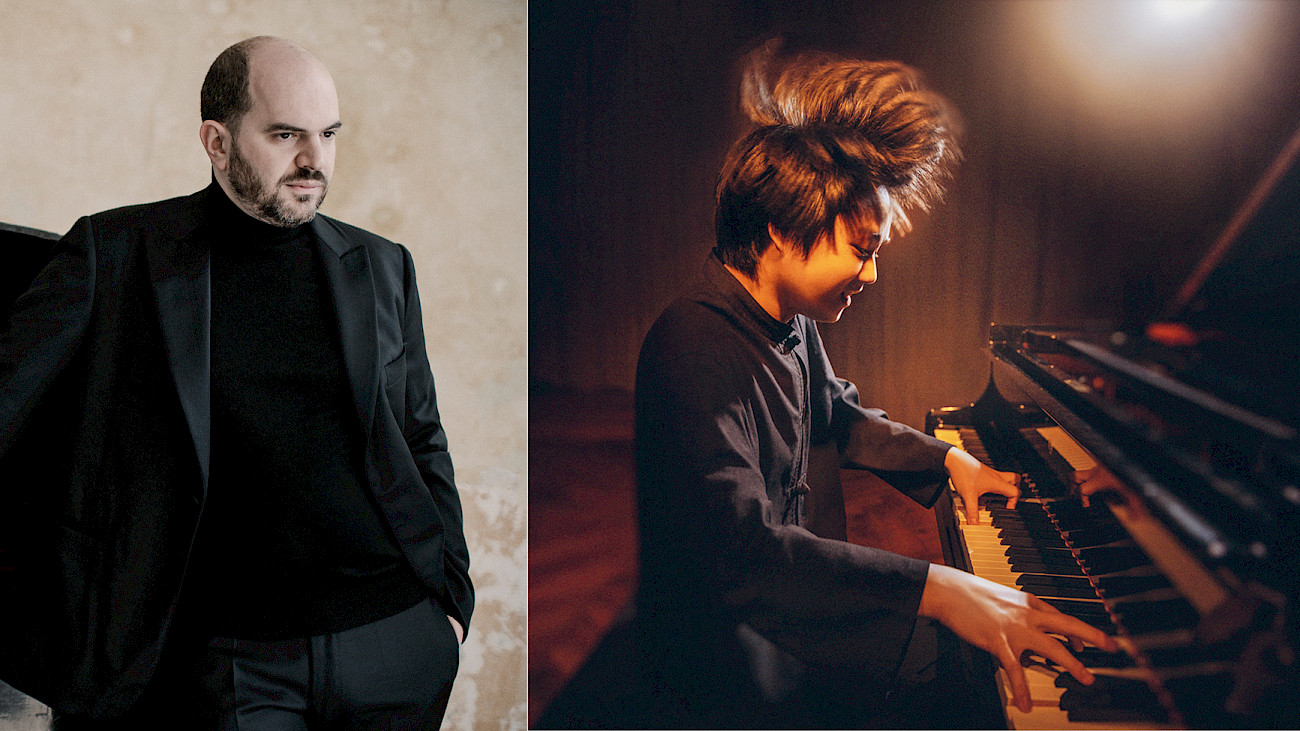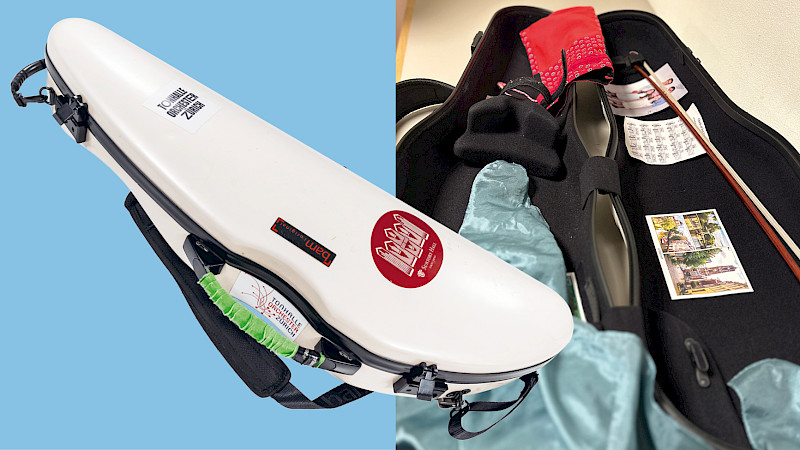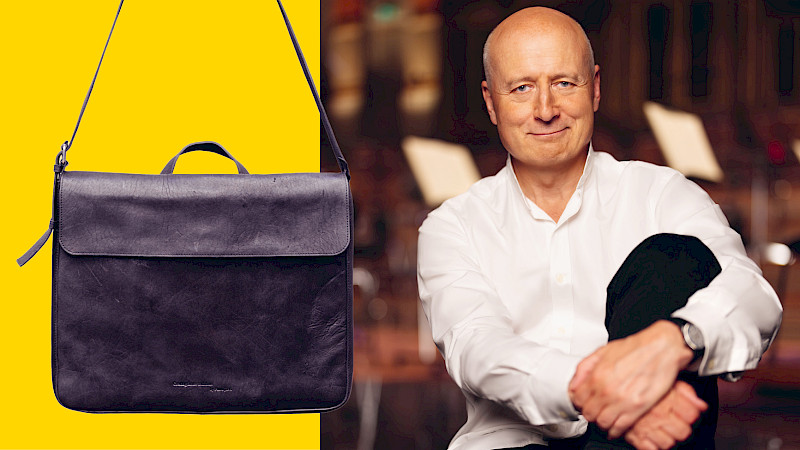
A student takes off
The 25-year-old Japanese pianist Mao Fujita will be making two debuts at the Tonhalle Zurich. We spoke to his teacher Kirill Gerstein.
For Mao Fujita, everything is happening at the same time. He is still a student at the Hochschule für Musik Hanns Eisler in Berlin, but has already been dubbed a star in the Guardian. He has concert dates for numerous important venues in his diary - but also dates for a three-part final exam.
For his teacher in Berlin, the American pianist Kirill Gerstein, this is normal. "We're lifelong learners," he says during a flying visit to his dressing room before his last performance in Zurich. "I myself still visit my mentor, the now 89-year-old Hungarian pianist Ferenc Rados, from time to time. And Mao Fujita wants to learn, that is very pronounced in him. That won't change even after his formal graduation - he has the curiosity and enthusiasm for it."
The two met before the Tchaikovsky Competition, which brought Mao Fujita international attention. Initially they only met occasionally, but Fujita later moved to Berlin because of Gerstein from Portrait of Mao Fujita Japan and raves about his teacher in interviews: "He broadened my perspectives enormously, gave me lots of tips without forcing me to do anything," he once told Bayerischer Rundfunk.
What tips were those? Kirill Gerstein waves this off, saying that it's impossible to answer that so quickly, "I'd have to retell an entire course of study". But then he makes an attempt: their discussions are often about the musical context, he says. "It's like interpersonal relationships. 'How are you doing? I'm fine' - that can mean a lot of things." Accordingly, a forte in a score can also be interpreted very differently. The discussions with his pupil go far beyond the question of the attack: "In this day and age, we are used to knowing what will happen if we press this or that button. Questioning such certainties can also be frightening."
Mao Fujita - a career in data
2017
The 19-year-old Japanese student Mao Fujita wins first prize and all the minor prizes at the International Clara Haskil Piano Competition in Vevey.
2018
He is awarded second prize at the Tchaikovsky Competition in Moscow, one of the most important piano competitions of all.
2022
The pianist makes his debut at the Lucerne Festival.
2023
He makes his debut at New York's Carnegie Hall. He also receives an Opus Klassik for his recording of all Mozart sonatas, which is released by Sony.
2024
In addition to his solo activities, Mao Fujita continues to prepare for his concert exam at the Hanns Eisler School of Music in Berlin.
Swerves and flourishes
However, Mao Fujita is anything but timid. On the contrary, when a 25-year-old releases a complete recording of the Mozart sonatas, that's quite something. In this case, an extremely amusing one; the roguish charm with which he sprinkles a dodge here and a flourish there in these sonatas is just as infectious as his resounding laughter when he is asked about it in interviews. You get the impression that music is really a game for him - no compulsion, no show, nothing calculated.
There was no question of compulsion in his childhood either. Mao Fujita's father is a doctor, his mother a nurse. Although he started playing the piano at the age of three, it was not intended to be a profession; he chose it himself.
That it was the right choice became clear in 2017 at the International Clara Haskil Piano Competition in Vevey. There, Mao Fujita not only won first prize, the audience prize and the prize for the interpretation of a contemporary work. He also electrified the artistic director Martin Engstroem, who was sitting in the audience and immediately booked the young pianist for his Verbier Festival; first for the Academy and soon afterwards as a soloist. The Tchaikovsky Competition then opened further doors: to the Amsterdam Concertgebouw and the Elbphilharmonie, to the Leipzig Gewandhaus Orchestra and the Los Angeles Philharmonic, to conductors such as Semyon Bychkov and Riccardo Chailly.
Under Chailly's direction, Mao Fujita made his debut at the Lucerne Festival in 2022 with Rachmaninov's Piano Concerto No. 2 - and in such a way that no one would have thought of the phrase "keyboard lion". He also plays this work with astonishing lightness and enchanting sensitivity; certainly with power where necessary, but never in the sense of a demonstration of strength. This makes opposing voices audible, which are otherwise often drowned out, and the emotions are given shades that cannot be summarised in catchwords.
Doubting and convincing
Mao Fujita's Rachmaninov interpretations could also be seen as an answer to the question of what Kirill Gerstein conveys to his students. It is what Gerstein describes as a "tightrope walk": "On the one hand, you have to doubt and search - and on the other, you have to present your interpretative decisions on stage very confidently and convincingly."
Gerstein is not the only one to support Mao Fujita in this balancing act. In an interview for the Verbier Festival, he once named three other pianistic role models: the Romanian Dinu Lipatti, the American William Kapell and the Uzbek Alexei Sultanov. It is an unusual list, which on the one hand reveals how intensively and openly Mao Fujita engages with tradition. On the other hand, one wonders whether it is a coincidence that he mentioned three pianists of all people who died young: not serene old masters, but exceptional talents in the stage of promise.
The phase of promise is also his at the moment - and he has already begun to fulfil it. It is therefore fitting that he is taking two steps at once for his debut at the Tonhalle Zurich. In November, Mao Fujita will play a recital in the Série jeunes, in which promising young musicians introduce themselves. This will be followed in January by a regular orchestral concert with conductor Marek Janowski and Mozart's Piano Concerto No. 27: a clear sign that this pianist is already more than just a young hopeful.
We use deepL.com for our translations into English.





